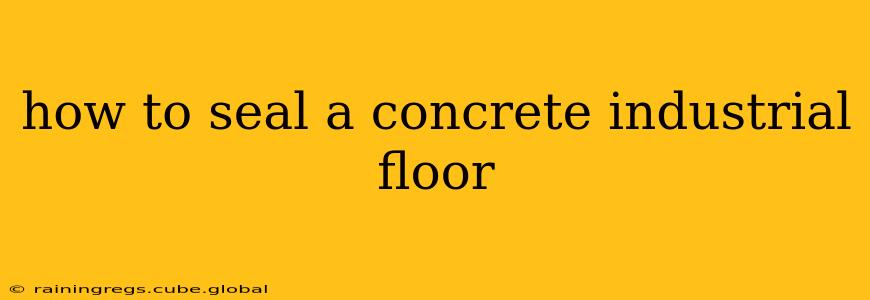Concrete industrial floors endure heavy traffic, harsh chemicals, and extreme temperature fluctuations. Sealing them isn't just about aesthetics; it's crucial for longevity, protecting your investment, and ensuring a safe working environment. This comprehensive guide will walk you through the process, answering common questions and offering expert advice.
What are the benefits of sealing a concrete industrial floor?
Sealing your concrete industrial floor offers a multitude of benefits, significantly extending its lifespan and improving its functionality. A properly sealed floor is more resistant to:
- Chemical damage: Spills and exposure to various chemicals are common in industrial settings. Sealers create a protective barrier, preventing chemicals from penetrating the concrete and causing deterioration.
- Abrasion and wear: Heavy foot traffic, machinery, and equipment can wear down concrete over time. Sealers add a layer of protection, reducing abrasion and extending the floor's life.
- Moisture damage: Concrete is porous and can absorb moisture, leading to cracking, dusting, and even structural damage. Sealers prevent moisture penetration, protecting against these issues.
- Dusting: Unsealed concrete can produce significant dust, a safety hazard and a maintenance nightmare. Sealers reduce dusting, creating a cleaner and safer work environment.
- Staining: Spills and other substances can stain unsealed concrete, making it look unkempt and unprofessional. Sealers make the floor easier to clean and prevent staining.
What type of sealer is best for my industrial concrete floor?
Choosing the right sealer is paramount. Several options exist, each with its strengths and weaknesses. Consider these factors when making your decision:
- Type of traffic: High-traffic areas require a more durable sealer than low-traffic areas.
- Chemical exposure: The type and frequency of chemical exposure will dictate the sealer's chemical resistance.
- Moisture levels: If moisture is a concern, a penetrating sealer might be more suitable.
- Gloss level: Do you prefer a high-gloss, semi-gloss, or matte finish? Gloss levels don't affect durability but do impact aesthetics.
Common types of sealers include:
- Epoxy sealers: Excellent for high-traffic areas and chemical resistance, offering superior durability. However, they are more expensive and require professional application for best results.
- Acrylic sealers: A more budget-friendly option, offering good protection against moisture and abrasion. They are less durable than epoxy sealers.
- Polyurethane sealers: Provide a tough, durable surface and excellent resistance to chemicals and abrasion. They are often chosen for high-traffic industrial environments.
- Penetrating sealers: These sealers soak into the concrete, hardening it from within. They're excellent for preventing moisture damage but may not offer the same level of surface protection as topical sealers.
How do I prepare my concrete floor for sealing?
Proper preparation is critical for a successful seal. Neglecting this step can lead to uneven application, reduced effectiveness, and premature sealer failure. The preparation process involves:
- Cleaning: Thoroughly clean the floor to remove all dirt, debris, grease, and oil. Pressure washing is often the most effective method.
- Repairing: Repair any cracks, chips, or holes in the concrete using appropriate patching compounds. Allow ample time for repairs to cure completely.
- Grinding: Grinding the floor's surface can improve the sealer's adhesion, especially for older or heavily worn concrete.
- Priming: In some cases, priming the concrete before applying the sealer can improve adhesion and ensure a more uniform finish. This is especially important with epoxy sealers.
How long does it take for a concrete floor sealer to dry?
Drying time varies significantly depending on the type of sealer, the temperature, and humidity. Always refer to the manufacturer's instructions for specific drying times. Generally, expect a drying time ranging from a few hours to several days. Avoid heavy traffic until the sealer is completely dry to prevent damage or premature wear.
How often should I reseal my concrete industrial floor?
The frequency of resealing depends on the type of sealer used, the level of traffic, and the severity of the conditions your floor endures. Some sealers may last for years, while others might require resealing annually. Regular inspection and maintenance are key to extending the lifespan of your sealer and your floor. Signs that you need to reseal include fading, wear, discoloration, or increased dusting.
What are the costs associated with sealing a concrete industrial floor?
Costs vary widely depending on the size of the floor, the type of sealer chosen, and whether you hire a professional. Professional application tends to be more expensive but ensures a higher quality finish and longer-lasting results. You'll also need to factor in the cost of preparation materials and any necessary repairs. Getting multiple quotes from reputable contractors is recommended for accurate cost estimation.
By following these steps and choosing the appropriate sealer for your specific needs, you can effectively protect your concrete industrial floor, enhancing its durability, safety, and aesthetic appeal for years to come. Remember that consulting with a flooring specialist can provide tailored advice for your unique situation and ensure the best possible outcome.
